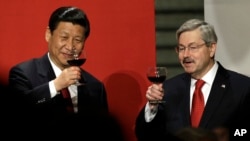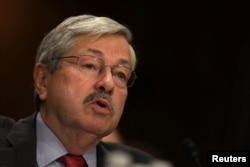President Donald Trump’s nominee to be the next ambassador in China is seen as an “old friend” of Chinese leader Xi Jinping. Iowa Governor Terry Branstad has known Xi since the young communist leader paid a visit to his home state in 1985.
But, being an “old friend” could be a blessing and a curse, analysts say.
During his hearing on Tuesday, Branstad received praise from lawmakers on both sides of the aisle and his nomination seems almost certain.
In his opening statement, he pledged to use what he called his unique position as an “old friend” of President Xi and a trusted confidant of President Trump to positively influence the U.S.-China relationship. He also made sure that lawmakers didn’t interpret that as a sign that he was in Xi’s pocket.
In the hearing, Branstad spoke about a wide range of issues sensitive to Beijing, including human rights, South China Sea, Taiwan and trade. And pledged to not go easy on Xi.
"The fact that the leader of China calls us an old friend doesn't mean that I'm going to be at all reluctant or bashful about bringing up issues where we think they have not been fair, and where Americans or anybody has been treated unfairly," said Branstad.
Francesco Sisci, a Beijing-based China commentator, said that given all of the thorny issues the two countries face, there are still some “choppy waters” ahead.
Having Branstad as ambassador will help, but Trump’s vacillating policy remarks have left a lot of room for interpretation from Beijing’s perspective, said Sisci.
“He [Trump] called Taiwan’s president and said oh well maybe it was not the right thing to do, but there was not a U-turn. And yes, I am not calling China a currency manipulator, but, you know, maybe in the future. And yes, I want China on board with North Korea, yeah, but I could act against North Korea on my own,” said Sisci.
Given the tense nature of ties and the enormous challenges the two countries face, it will be important that Branstad has a relationship with Xi. But from his perspective, Sisci said it is more important that Xi knows Branstad. That way, China’s leader can use Branstad to relay messages to President Trump when needed.
“At the end of the day, however friendly he may be, he responds to another government, but the fact that he’s friendly especially at this moment, it could be a great help,” said Sisci.
David Kelly, director of research at China Policy says the perception of being a friend of Beijing does not always play to one’s favor.
Kelly notes that while former U.S. Ambassador to China, Gary Locke, was initially perceived as being a good choice, given his Chinese heritage, he eventually ran into trouble over his assistance in the flight of a blind dissident lawyer.
“But, when he came into China, he then got caught up in the Chen Guangcheng affair and ended up being seen as no great friend of China and of being a little too loyal to his Washington masters,” Kelly says.
Beijing appears to already be managing perceptions. Coverage in state media on Wednesday was sparse and focused largely on his comment to make the relationship better.
China’s main state broadcaster CCTV, however, did carry a story about the hearing, including a soundbite from Branstad where he talked about his willingness to meet with people of all backgrounds at the U.S. Embassy.
The report neglected to mention, however, that he included inviting dissidents as well.
On social media, comments were nearly non-existent. Most of those who did comment voiced their hope that Branstad would help build better ties between the two countries.
Others were more skeptical. One post on China’s Twitter-like microblog Weibo says: “Tillerson is also Russia and Putin’s ‘old friend,’ don’t know if this ‘old friend’ of China’s ‘friendship’ will last!”
Brian Kopczynski also contributed to this report.





